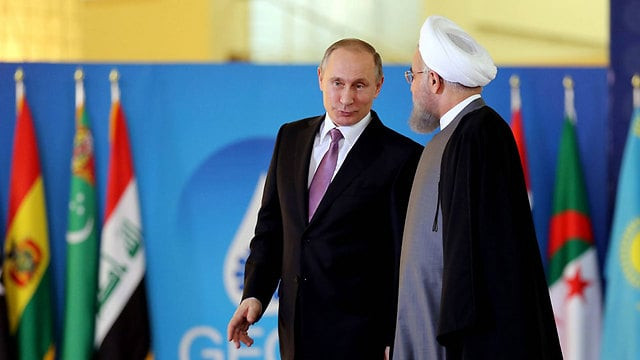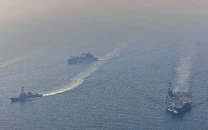Iran unveils S-300 missile system parts at army parade
Iran uses its annual Army Day parade Sunday to showcase parts of a long-awaited air defence system ordered from Russia

PHOTO: AFP
The S-300 system has been on order since 2007 but Russia postponed the sale three years later after the UN Security Council passed a resolution relating to Iran's nuclear programme.
A deal between Iran and six world powers over its nuclear activities which lifted sanctions in January removed the barriers to delivery but the fully operational system is still awaited.
According to pictures published by the semi-official ISNA news agency, S-300 missile tubes and the radar equipment were shown during the military parade held in southern Tehran.
Iran's General Soleimani in Moscow for talks
Iran insists the system is necessary to defend itself from threats of attack, including possible bombing of its nuclear facilities, and the S-300 would allow early detection of approaching aircraft.
Israel and the United States have hit out at the sale, which is seen as a means for Russia to maintain influence in the Middle East.
Iran and Russia are also in talks on a sale of the Sukhoi SU-30 fighter, another proposal criticised by the US. Iran's current air force fleet dates from the pre-revolutionary era of the Shah.
Speaking at Sunday's parade, President Hassan Rouhani insisted Iran's plans to upgrade its military capabilities were defensive in nature, referring to the worst conflicts in the Middle East.
"Our military, political and economic power is not directed against neighbouring countries and the countries of the Islamic world.
Russia to start deliveries of S-300 missiles to Iran in coming days
"When Baghdad was threatened by terrorists, the Islamic Republic of Iran responded to the call of the people, the army and the Iraqi government to defend Baghdad and the holy places," he said, referring to the surge of the jihadist Islamic State group in June 2014.
The same action was taken in Syria, where Iran has supported President Bashar al-Assad's regime with military and financial aid, he added.
The upgrading of Iran's military following the nuclear deal has also alarmed Saudi Arabia, Tehran's regional rival.
Riyadh routinely accuses Iran of interfering in Arab countries.
Saudi Arabia cut diplomatic ties with Iran in January after a row broke out over the execution of Shiite cleric and activist Nimr al-Nimr by the Sunni kingdom.
Angry Iranian mobs stormed and set fire to Saudi Arabia's embassy in Tehran and its mission in Mashhad, Iran's second city.
The attacks were immediately condemned by Rouhani and, a few weeks later, by the Islamic republic's supreme leader, Ayatollah Ali Khamenei.



















COMMENTS
Comments are moderated and generally will be posted if they are on-topic and not abusive.
For more information, please see our Comments FAQ